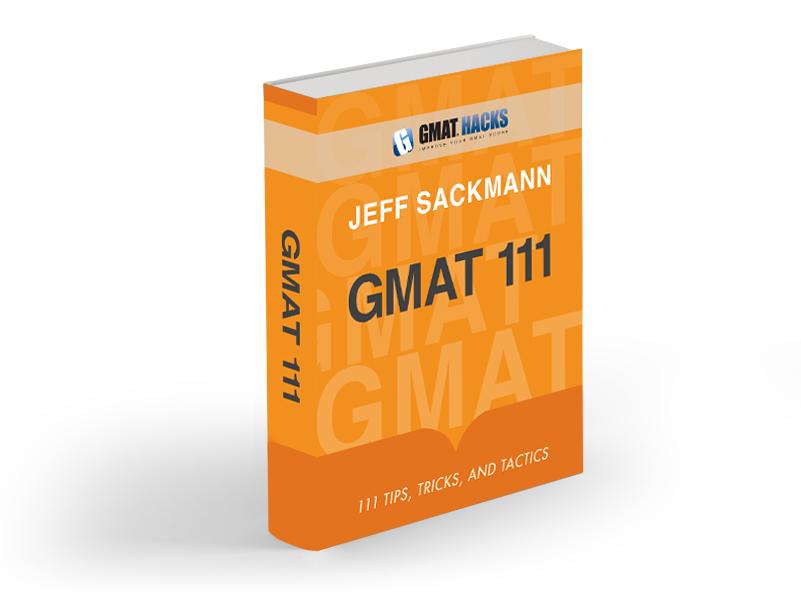
 |
GMAT 111 Home
Free Chapter Excerpts
Introduction
Table of Contents
GMAT Hacks Testimonials
Buy print version at Amazon.com
Buy for Amazon Kindle

About the Author
Jeff Sackmann has been helping students like you reach their GMAT score goals for nearly a decade. Jeff began as a star tutor and classroom teacher for a big test-prep company. Since 2006, he has focused on developing the best materials in the industry, saving you time, money, and stress.
Based in New York City, Jeff has created many resources for GMAT preparation, including the popular Total GMAT Math and Total GMAT Verbal, as well as 1,800 practice GMAT math questions and his Guides to the Official Guide.

GMAT 111 Table of Contents
There's a ton of material in my new book, GMAT 111. It covers the exam from every angle, with tips from the beginning of the study process to the middle of the test itself.
Here's a complete list of the contents. Each chapter (e.g. "Research schools and get a goal score") is about two paragraphs, or somewhere between a half page and a full page. You can also look at a couple of free excerpts to get a better idea of what's included!
- The Plan of Attack
- Research schools and get a goal score
- Plan for your score
- Give yourself ample study time
- Book your GMAT test date
- Keep your options open
- Carve out a consistent study schedule
- Use high-quality materials
- Take practice tests ... but not too many
- Winning Study Strategies
- Seclude yourself
- Put your stopwatch to good use
- Review every question
- Redo questions for mastery
- Practice realistic scratchwork
- Avoid burnout
- Exhaust The Official Guide
- Make the most of a tutor
- Beat test anxiety
- The Computer-Adaptive Test
- Prepare for a roller-coaster
- Don't overanalyze
- Expect to get questions wrong (PDF excerpt)
- Keep the first few questions in perspective
- Go with the experimental flow
- Guess aggressively
- Cut your losses
- Finish each section
- Make your practice tests realistic
- Approaching the Quantitative Section
- Give the core content its due
- Realize you can learn
- Treat the "easy" parts like hard ones
- Memorize multiplication tables
- Practice mental math
- Avoid long division
- Expect the answers to "work out"
- Prioritize conceptual understanding
- Keep your notes organized and readable
- Watch the clock
- GMAT Math Topics
- Memorize relationships between fractions, decimals, and percents
- Internalize prime numbers
- Master geometry rules
- Get comfortable with exponents
- Deploy the rate formula often
- Combine rates with ease
- Use tables for overlapping sets
- Compare the mean and median
- Distinguish combinations from permutations
- Handle multiple figures
- GMAT Math Strategies
- Do something!
- Translate the word problem
- Eliminate irrelevant techniques
- Consider the time investment (PDF excerpt)
- Look for the relationship
- Approximate
- Take advantage of the answer choices
- Avoid answer choices that stand out
- Data Sufficiency
- Have patience with the learning curve
- Memorize the answer choices
- Don't calculate more than you have to ...
- ... but write something down!
- Generalize
- Be alert to assumptions
- Watch out for special numbers
- View the diagram with skepticism
- Don't jump to choice (C)
- Introduction to GMAT Verbal
- Plan your time
- Be ready to change gears
- Take mini-breaks to maintain focus
- Keep making notes
- Avoid "almost right" answers
- Critical Reasoning
- Read the question first
- Recognize variants of strengthen & weaken
- Stick with what's on the page
- Stay within the scope
- Look for causal relationships
- Check to see if the sample is representative
- Let the GMAT teach you science (PDF excerpt)
- Infer what fills in the blank
- Study the bold ... and the un-bold
- Avoid strongly worded choices
- Reading Comprehension
- Read the passage first
- Spend no more than 4 minutes per passage
- Identify important parts of the passage
- Outline the passage on paper
- Look for the author's position
- Read science passages for structure
- Maintain a steady focus
- Give short passages their due
- Hunt for details
- Apply Critical Reasoning skills
- Practice with book reviews
- Sentence Correction
- Work fast and make predictions
- "Listen" to the whole sentence
- Look for lists
- Watch out for pronouns
- Learn idioms by practice
- Use answer choices to analyze the sentence
- Keep it active
- Edit for length
- Retain the meaning
- Don't be afraid of choice (A)
- Analytical Writing Assessment
- Don't stress about it
- Emphasize structure
- Write about what you know
- Save time for editing
- Write essays on at least one practice test
- Test Day
- Read about the experience
- Prepare a snack
- Get there early
- Expect to follow protocol
- Make sure you have what you need
- Take the breaks
- Remember your preparation